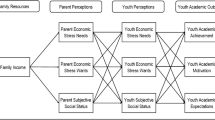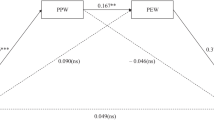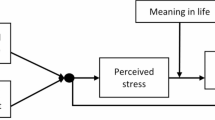Abstract
The association between perceived economic stress (current economic hardship and future economic worry) and adolescent adjustment was examined in 229 Chinese adolescents using children and parental reports of perceived economic stress. Parents displayed higher levels of current economic hardship and future economic worry than their children did and mothers had more worry about their children's economic conditions in future than the fathers had. Higher levels of economic stress based on ratings obtained from different sources were generally related to lower levels of existential well-being, life satisfaction, self-esteem, and mastery as well as higher levels of general psychiatric morbidity and substance abuse in adolescents. Relative to current economic stress perceived by adolescents, future economic worry perceived by adolescents was more strongly related to the psychological well-being of Chinese adolescents with economic disadvantage.
Similar content being viewed by others
REFERENCES
Aldwin, C. M., and Revenson, T. A. (1986). Vulnerability to economic stress. Am J Community Psychol. 14: 161–175.
Barrera, M., Caples, H., and Tein, J. Y. (2001). The psychological sense of economic hardship: Measurement models, validity, and cross-ethnic equivalence for urban families. Am J Community Psychol. 29: 493–517.
Chan, D. W. (1985). The Chinese version of the General Health Questionnaire: Does language make a difference? Psychol. Med. 15: 147–155.
Coley, R. L., and Chase-Lansdale, L. (2000). Welfare receipt, financial strain, and African-American adolescent functioning. Soc. Serv. Rev. 74: 380–404.
Conger, R. D., Ge, X. J., Elder, G. H., Lorenz, F. O., and Simons, R. L. (1994). Economic stress, coercive family process, and developmental problems of adolescents. Child Dev. 65: 541–561.
Conger, K. J., Rueter, M. A., and Conger, R. D. (2000). The role of economic pressure in the lives of parents and their adolescents: The family stress model. In Crockett, L. J., and Silbereisen, R. K. (eds.), Negotiating Adolescence in Times of Social Change. Cambridge University Press, New York, (pp. 201–233).
Corbett, T. (1993). Child poverty and welfare reform: Progress or paralysis? Focus 15: 1–17.
Diener, E. (1984). Subjective well-being. Psychol. Bull. 95: 542–575.
Diener, E., Emmons, R. A., Larsen, R. J., and Griffin, S. (1985). The Satisfaction with Life Scale. J. Pers. Assess. 49: 71–75.
Folkman, S., Schaefer, C., and Lazarus, R. S. (1979). Cognitive processes as mediators of stress and coping. In Hamilton, V., and Warburton, J. (eds.), Human Stress and Cognition. Wiley, New York, pp. 265–298.
Ge, X. J., Conger, R. D., Lorenz, F. O., Elder, G. H., Montague, R. B., and Simons, R. L. (1992). Linking family economic hardship to adolescent distress. J. Res. Adolesc. 2: 351–378.
Goldberg, D. P. (1972). The Detection of Psychiatric Illness by Questionnaire. Oxford University Press, Oxford.
Hilton, J. M., and Desrochers, S. (2000). The influence of economic strain, coping with roles, and parental control on the parenting of custodial single mothers and custodial single fathers. J. Divorce Remarr. 33: 55–76.
Kinnunen, U., and Pulkkinen, L. (1998). Linking economic stress to marital quality among Finnish marital couples. J. Fam. Issues. 19: 705–724.
Larzelere, R. E., and Mulaik, S. A. (1977). Single-sample tests for many correlations. Psychol. Bull. 84: 557–569.
Lavee, Y., Sharlin, S., and Katz, R. (1996). The effect of parenting stress on marital quality: An integrated mother-father model. J. Fam. Issues. 17: 114–135.
Lazarus, R. S., and Folkman, S. (1984). Stress, Appraisal and Coping. Springer, New York
Lempers, J. D., Clark-Lempers, D., and Simons, R. L. (1989). Economic hardship, parenting and distress in adolescence. Child Dev. 60: 25–39.
Luthar, S. S. (1997). Sociodemographic disadvantage and psychological adjustment: Perspectives from developmental psychopathology. In Luthar, S. S., Burack, J. A., Cicchetti, D., and Weisz, J. R. (eds.), Developmental Psychopathology. Cambridge University Press, New York, pp. 459–585.
McLoyd, V. C. (1998). Socioeconomic disadvantage and child development. Am. Psychol. 53: 185–204.
McLoyd, V. C., Jayaratne, T. E., Ceballo, R., and Borquez, J. (1994). Unemployment and work interruption among African American single mothers: Effects on parenting and adolescent socioemotional functioning. Child Dev. 65: 562–589.
MyLoyd, V. C., and Wilson, L. (1991). The strain of living poor: Parenting, social support and child mental health. In Huston, A. C. (ed.), Children in Poverty. Cambridge University Press, Cambridge, New York, pp. 105–135.
Ohannessian, C. M., Lerner, R. M., Lerner, J. V., and von Eye, A. (1995). Discrepancies in adolescents' and parents' perceptions of family functioning and adolescent emotional adjustment. J. Early Adolesc. 15: 490–516.
Orthner, D. K. (1996). Families in poverty: Key issues for research. J. Fam. Issues. 17: 588–592.
Paloutzian, R. F., and Ellison, C. W. (1982). Loneliness, spiritual well-being and the quality of life. In Peplau, L. A., and Perlman, D. (eds.), Loneliness: A Sourcebook of Current Theory, Research and Therapy. Wiley, New York, pp. 224–237.
Pearlin, L. I., and Schooler, C. (1978). The structure of coping. J. Health Soc. Behav. 22: 337–356.
Rosenberg, M. (1979). Conceiving the Self. Basic Books, New York.
Shek, D. T. L. (1989). Validity of the Chinese version of the General Health Questionnaire. J. Clin. Psychol. 45: 890–897.
Shek, D. T. L. (1992). “Actual-ideal” discrepancies in the representation of self and significant-others and psychological well-being in Chinese adolescents. Int. J. Psychol. 27: 229.
Shek, D. T. L. (1993). The factor structure of the Chinese version of the General Health Questionnaire (GHQ-30): A confirmatory factor analysis. J. Clin. Psychol. 49: 678–684.
Shek, D. T. L. (1998). A longitudinal study of the relations of family functioning to adolescent psychological well-being. J. Youth Stud. 1: 195–209.
Shek, D. T. L. (1999). Parental and adolescent perceptions of family functioning: A longitudinal study in a Chinese context. Am. J. Fam. Ther. 27: 303–314.
Shek, D. T. L. (2000). Chinese adolescents' perceptions of parental differences in parenting characteristics, parent-adolescent communication and parent-adolescent relationship. Adolescence 35: 135–146.
Shek, D. T. L. (2001). Perceptions of happy families amongst Chinese adolescents and their parents: Implications for family therapy. Fam. Ther. 28: 73–103.
Shek, D. T. L. (2002). The relation of parental qualities to psychological well-being, school adjustment and problem behavior in Chinese adolescents with economic disadvantage. Am. J. Fam. Ther. 30: 215–230.
Shek, D. T. L., and Ma, H. K. (1997). Perceptions of parental treatment styles and adolescent antisocial and prosocial behavior in a Chinese context. Psychologia 40: 233–240.
Shek, D. T. L., Tsoi, K. W., Lau, P., Tsang, K. M., Lam, M. C., and Lam, C. M. (2001). Psychological well-being, school adjustment and problem behavior in Chinese adolescents: Do parental qualities matter? Int. J. Adolesc. Med. Health 13: 231–243.
Stern, S. B., Smith, C. A., and Jang, S. J. (1999). Urban families and adolescent mental health. Soc. Work Res. 23: 15–27.
Tabachnick, B. G., and Fidell, L. S. (1996). Using Multivariate Statistics. HarperCollins, New York
Takeuchi, D. T., and Williams, D. R. (1991). Economic stress in the family and children's emotional and behavioral problems. J. Marr. Fam. 53: 1031–1041.
Whitbeck, L. B., Simons, R. L., Conger, R. D., Wickrama, K. A. S., Ackley, K. A., and Elder, G. H. (1997). The effects of parents' working conditions and family economic hardship on parenting behaviors and children's self-efficacy. Soc. Psychol. Q. 60: 291–303.
Author information
Authors and Affiliations
Rights and permissions
About this article
Cite this article
Shek, D.T.L. Economic Stress, Psychological Well-Being and Problem Behavior in Chinese Adolescents with Economic Disadvantage. Journal of Youth and Adolescence 32, 259–266 (2003). https://doi.org/10.1023/A:1023080826557
Issue Date:
DOI: https://doi.org/10.1023/A:1023080826557




